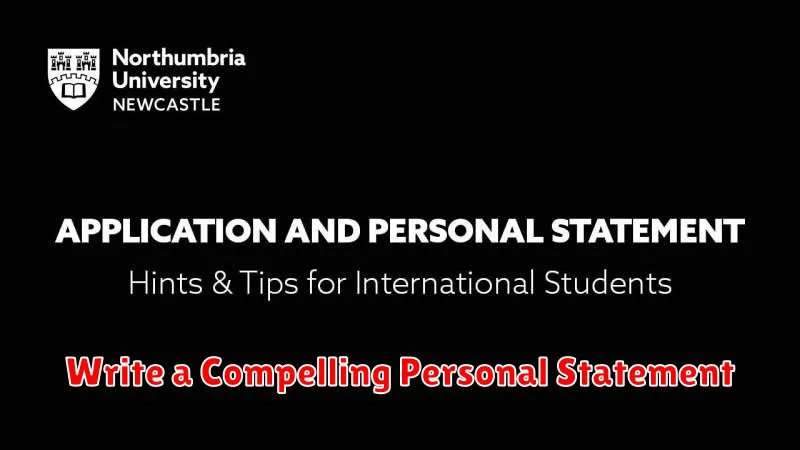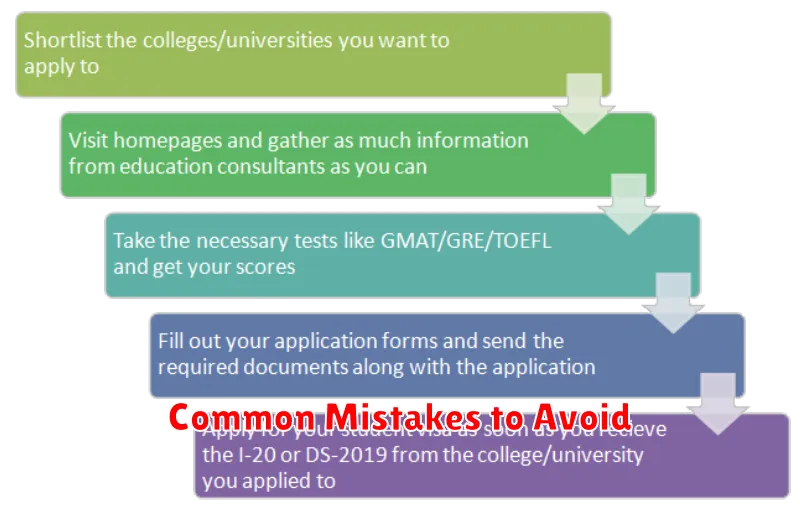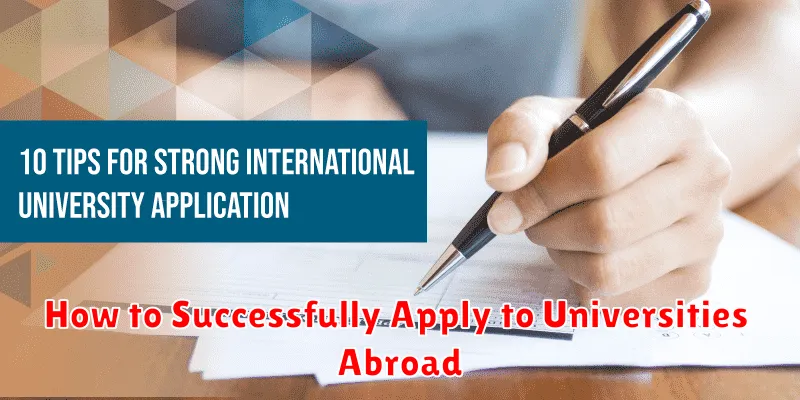Applying to universities abroad can be a daunting but rewarding experience. It requires careful planning, diligent research, and a strategic approach. This comprehensive guide provides prospective international students with actionable steps to navigate the complexities of applying to universities abroad. We will cover key aspects, from selecting the right program and preparing a compelling application to securing financial aid and navigating the visa process. Whether you aspire to pursue undergraduate studies, a master’s degree, or a doctoral program in a foreign country, this guide equips you with the necessary knowledge and resources to successfully apply to universities abroad and achieve your academic goals.
Successfully applying to universities abroad hinges on understanding the specific requirements of each institution and country. This article will delineate the essential components of a successful application, including crafting a strong personal statement, securing letters of recommendation, achieving the required standardized test scores (such as the TOEFL or IELTS), and demonstrating your financial stability. By understanding these crucial elements and following the steps outlined in this guide, you can significantly increase your chances of acceptance into your desired universities abroad and embark on a transformative international educational journey.
Research and Shortlist Universities
Thoroughly researching potential universities is crucial. Consider factors like academic programs, faculty expertise, research opportunities, and overall university ranking. Also, evaluate the location, campus culture, and student support services.
Create a shortlist of universities that align with your academic goals and personal preferences. This list should include reach schools, target schools, and safety schools to maximize your chances of acceptance.
Use university websites, online resources, and educational fairs to gather information. Speaking with current students or alumni can also provide valuable insights.
Understand Admission Requirements
One of the most crucial steps in applying to universities abroad is thoroughly understanding their admission requirements. Each institution and program will have specific criteria.
Key requirements typically include academic transcripts, standardized test scores (such as the SAT or ACT for US universities, or IELTS/TOEFL for English language proficiency), letters of recommendation, and a personal statement or essays.
Researching these requirements early in the application process is vital. Pay close attention to deadlines and any specific document formatting or translation requirements. Check university websites and reach out to admissions offices directly for clarification if needed.
Write a Compelling Personal Statement

Your personal statement is a critical component of your university application. It’s your opportunity to showcase your unique qualities, experiences, and aspirations to the admissions committee. A compelling narrative can significantly impact your chances of acceptance.
Focus on showcasing your genuine self. Highlight experiences that have shaped you, demonstrating your passion for your chosen field of study, and explaining how your skills and experiences align with the university’s values and program offerings. Clearly articulate your academic and career goals.
Structure your statement thoughtfully. Begin with a captivating introduction, develop your narrative with concrete examples, and conclude with a concise summary of why you are an ideal candidate.
Gather Letters of Recommendation
Strong letters of recommendation play a vital role in your university application. They offer a third-party perspective on your abilities, character, and potential for success.
Start early. Give your recommenders ample time, ideally at least a month, to write thoughtful letters. Choose recommenders who know you well and can speak to your academic and personal strengths.
Provide them with the necessary materials, such as your transcript, resume, and a list of universities you are applying to. This allows them to tailor their letters effectively. Follow up politely to ensure they submit their recommendations before the deadlines.
Prepare for Entrance Exams
Entrance exams are a critical part of the university application process. Understanding the required exams and preparing adequately is essential for a successful application.
Research required exams. Different universities and programs may require different standardized tests. Common examples include the SAT, ACT, GRE, GMAT, and TOEFL or IELTS. Carefully review the application requirements for each university you’re interested in.
Create a study plan. Allocate sufficient time for preparation. Consider your strengths and weaknesses to focus your study efforts effectively.
Utilize available resources. Practice tests, study guides, and online resources can significantly enhance your preparation. Consider enrolling in a test preparation course if needed.
Manage Application Deadlines
Meeting application deadlines is crucial for a successful university application abroad. Start by researching each university’s specific deadlines, as they vary significantly. Create a comprehensive spreadsheet or calendar to track these dates, including deadlines for standardized tests, transcripts, and recommendation letters.
Prioritize applications and allocate sufficient time for each, considering potential delays. Aim to submit your materials well in advance of the deadline to avoid last-minute complications. Don’t underestimate the time required for each step of the application process.
Understand Financial Aid Options
Navigating the financial aspect of studying abroad is crucial. Financial aid can significantly reduce the burden of tuition fees and living expenses. Be sure to thoroughly research and understand the various options available.
Scholarships are merit-based and often awarded for academic excellence, specific talents, or extracurricular achievements. They typically do not require repayment. Grants, similar to scholarships, are usually need-based and don’t require repayment. Loans, however, must be repaid with interest. Explore both government and private loan options.
University-specific aid is another avenue to explore. Many institutions offer their own financial aid packages to international students. Consult the financial aid office of your prospective universities for specific details and application requirements.
Proofread Your Application Carefully
Thorough proofreading is crucial for a successful application. Errors in grammar, spelling, or punctuation can create a negative impression, suggesting a lack of attention to detail. Admissions committees value polished and professional applications.
Review every section of your application multiple times. Consider asking a trusted friend, teacher, or mentor to proofread your materials as well. A fresh pair of eyes can often catch mistakes that you may have overlooked.
Pay close attention to:
- Grammar and Spelling: Ensure proper sentence structure and correct spelling throughout your application.
- Punctuation: Double-check commas, periods, and other punctuation marks.
- Clarity and Conciseness: Make sure your writing is clear, concise, and easy to understand.
- Consistency: Verify that dates, names, and other information are consistent across all documents.
Interview Preparation Tips
Acing your university interview is crucial. Practice is key. Conduct mock interviews with a mentor, teacher, or friend to refine your responses and build confidence.
Research the university and program thoroughly. Understanding their values and curriculum will allow you to articulate why you are a good fit.
Prepare to discuss your strengths, experiences, and aspirations. Be ready to answer common interview questions like “Tell me about yourself” and “Why are you interested in this program?”.
Dress professionally and arrive on time (or even a few minutes early for virtual interviews). Maintain eye contact and engage actively with the interviewer.
Common Mistakes to Avoid

Applying to universities abroad is a complex process. Avoiding these common pitfalls can significantly improve your chances of acceptance.
Application Errors
Missing deadlines is a critical error. Ensure you are aware of each university’s specific deadlines. Incomplete applications are also frequently overlooked. Double-check that all required documents and information are provided.
Academic Missteps
Failing to meet the minimum academic requirements can lead to automatic rejection. Ignoring specific program prerequisites is another frequent oversight. Carefully research each program’s requirements.
Recommendation and Essay Issues
Generic letters of recommendation lack the personalized insights admissions committees value. Submitting a poorly written or plagiarized personal essay can severely harm your application. Invest time in crafting a compelling and authentic narrative.

